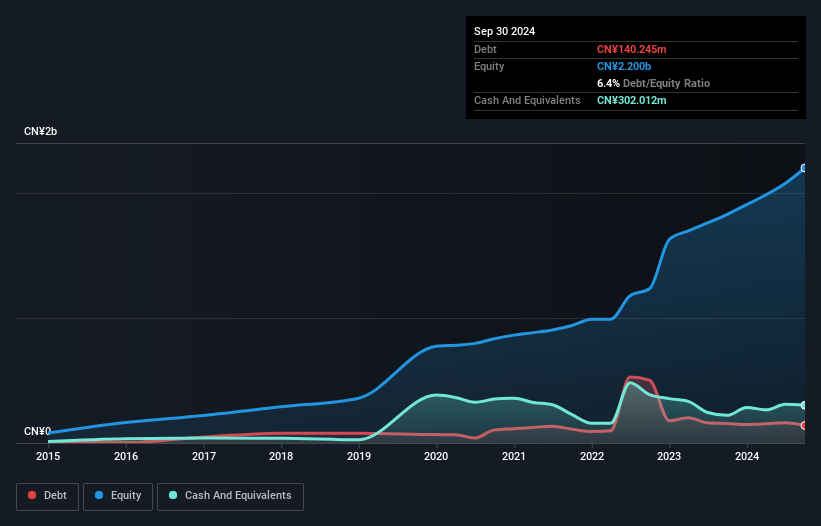- China
- /
- Electronic Equipment and Components
- /
- SZSE:300811
Is POCO Holding (SZSE:300811) A Risky Investment?
Warren Buffett famously said, 'Volatility is far from synonymous with risk.' When we think about how risky a company is, we always like to look at its use of debt, since debt overload can lead to ruin. We can see that POCO Holding Co., Ltd. (SZSE:300811) does use debt in its business. But is this debt a concern to shareholders?
What Risk Does Debt Bring?
Debt assists a business until the business has trouble paying it off, either with new capital or with free cash flow. Ultimately, if the company can't fulfill its legal obligations to repay debt, shareholders could walk away with nothing. While that is not too common, we often do see indebted companies permanently diluting shareholders because lenders force them to raise capital at a distressed price. Of course, plenty of companies use debt to fund growth, without any negative consequences. The first step when considering a company's debt levels is to consider its cash and debt together.
See our latest analysis for POCO Holding
How Much Debt Does POCO Holding Carry?
As you can see below, POCO Holding had CN¥140.2m of debt at September 2024, down from CN¥155.7m a year prior. However, its balance sheet shows it holds CN¥302.0m in cash, so it actually has CN¥161.8m net cash.

How Healthy Is POCO Holding's Balance Sheet?
According to the last reported balance sheet, POCO Holding had liabilities of CN¥307.8m due within 12 months, and liabilities of CN¥316.7m due beyond 12 months. On the other hand, it had cash of CN¥302.0m and CN¥830.7m worth of receivables due within a year. So it can boast CN¥508.2m more liquid assets than total liabilities.
This short term liquidity is a sign that POCO Holding could probably pay off its debt with ease, as its balance sheet is far from stretched. Simply put, the fact that POCO Holding has more cash than debt is arguably a good indication that it can manage its debt safely.
In addition to that, we're happy to report that POCO Holding has boosted its EBIT by 39%, thus reducing the spectre of future debt repayments. When analysing debt levels, the balance sheet is the obvious place to start. But it is future earnings, more than anything, that will determine POCO Holding's ability to maintain a healthy balance sheet going forward. So if you're focused on the future you can check out this free report showing analyst profit forecasts.
Finally, a business needs free cash flow to pay off debt; accounting profits just don't cut it. POCO Holding may have net cash on the balance sheet, but it is still interesting to look at how well the business converts its earnings before interest and tax (EBIT) to free cash flow, because that will influence both its need for, and its capacity to manage debt. Over the last three years, POCO Holding saw substantial negative free cash flow, in total. While that may be a result of expenditure for growth, it does make the debt far more risky.
Summing Up
While it is always sensible to investigate a company's debt, in this case POCO Holding has CN¥161.8m in net cash and a decent-looking balance sheet. And it impressed us with its EBIT growth of 39% over the last year. So we are not troubled with POCO Holding's debt use. Over time, share prices tend to follow earnings per share, so if you're interested in POCO Holding, you may well want to click here to check an interactive graph of its earnings per share history.
Of course, if you're the type of investor who prefers buying stocks without the burden of debt, then don't hesitate to discover our exclusive list of net cash growth stocks, today.
New: Manage All Your Stock Portfolios in One Place
We've created the ultimate portfolio companion for stock investors, and it's free.
• Connect an unlimited number of Portfolios and see your total in one currency
• Be alerted to new Warning Signs or Risks via email or mobile
• Track the Fair Value of your stocks
Have feedback on this article? Concerned about the content? Get in touch with us directly. Alternatively, email editorial-team (at) simplywallst.com.
This article by Simply Wall St is general in nature. We provide commentary based on historical data and analyst forecasts only using an unbiased methodology and our articles are not intended to be financial advice. It does not constitute a recommendation to buy or sell any stock, and does not take account of your objectives, or your financial situation. We aim to bring you long-term focused analysis driven by fundamental data. Note that our analysis may not factor in the latest price-sensitive company announcements or qualitative material. Simply Wall St has no position in any stocks mentioned.
About SZSE:300811
POCO Holding
Develops, produces, and sells alloy soft magnetic powder, and alloy soft magnetic core and related inductance components for the downstream users of electricity electronic equipment.
Flawless balance sheet with high growth potential.
Market Insights
Community Narratives



